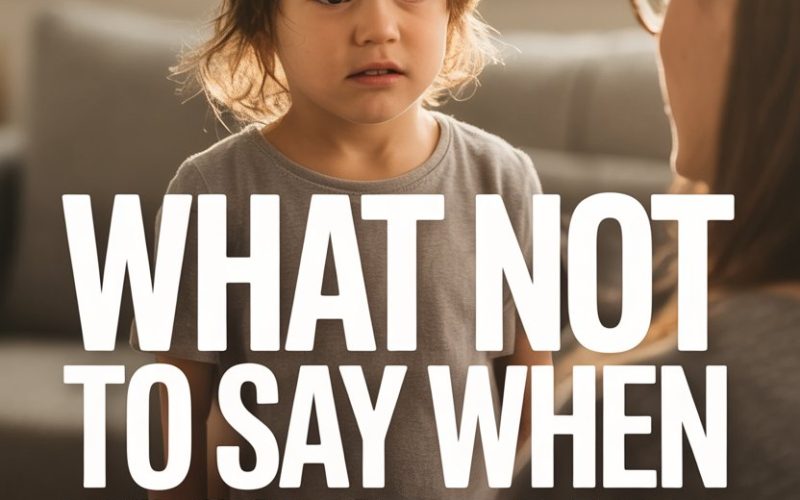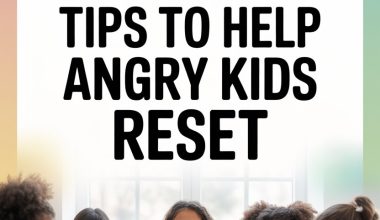Some days, parenting feels a bit like trying to herd caffeinated cats while balancing a tub of jelly on your head—tricky, sticky, and inevitably messy.
Tempers flare, voices rise, and before you know it, you’ve said something to your child that you regret more than that neon-green 90s tracksuit you thought was a good idea.
Raising children is a marathon, not a sprint, and nobody crosses the finish line with a perfect score. But a few words spoken in anger can leave marks that last longer than a forgotten timeout.
Tense moments with kids are inevitable.
The trick isn’t avoiding anger (good luck with that), but learning what not to say when your veins are throbbing and your inner dragon wants to breathe fire.
Here’s how to sidestep some of the worst verbal potholes—and what to try instead.
You Always/You Never
Absolutes are tempting when you’re seething. “You always leave your socks everywhere!” or “You never listen!”—classic lines straight out of the frustrated parent’s playbook.
Here’s the problem: these phrases aren’t just exaggerated (unless your child is somehow omnipresently scattering socks across the known universe), they also put kids on the defensive.
Children tune out, feel misunderstood, and start believing these sweeping statements. Psychologists explain that excessive use of absolutes can hurt a child’s self-esteem and make conflict resolution harder.
Swap out those absolutes for something specific. “I noticed the socks under the coffee table again. Could you please pop them in the laundry basket?” It’s less dramatic, but far more effective.
Why Can’t You Be More Like…
The old comparison game. Maybe it’s a sibling, a neighbour, or the fictional child your friend seems to have raised who eats kale chips without a bribe.
Comparing kids chips away at their confidence and breeds resentment—both towards you and the poor soul they’re being pitted against.
The American Academy of Pediatrics warns that comparison can damage the parent-child bond and hamper a child’s own identity.
Every child is unique, with their own quirks and talents (some more useful than others, granted). Celebrate what makes your child them, even if it isn’t a penchant for tidiness or advanced origami.
I Wish You Were Never Born
If there’s ever an Olympic sport for things never to say, this one takes gold every time. Even muttered in the heat of the moment, words like this can be devastating.
Children internalise statements deeply, and these can create wounds that don’t heal with a simple apology.
If you feel the urge to say something so heavy, it’s time to remove yourself from the situation. Pop yourself in a grown-up timeout.
Your child’s sense of belonging and worth depends on knowing they are loved, even when you’re mad enough to see stars.
Because I Said So
Ah, the classic parental mic drop. It might feel satisfying, and it works—temporarily. But relying on this phrase can backfire in the long run.
Unless you want your child to become a master in passive resistance or stealth rebellion, it’s worth finding a better option.
Research from developmental experts shows that children respond better to reasoning. Explanations help them understand the “why” behind rules, leading to better cooperation.
Even a quick “You need to go to bed now, because your body needs sleep to grow big and strong” can do wonders. (Bonus points for not sounding like a robot.)
You’re Such a Bad Kid
Separating the “deed” from the “doer” is Parenting 101, yet slips happen. Labelling a child as “bad” (or “naughty,” “lazy,” etc.) sticks with them.
Over time, they start to believe these labels, and the cycle continues.
Focus on actions, not identity. “It wasn’t okay to hit your sister,” says what needs saying without attacking your child’s character.
You’re correcting a behaviour, not handing out a permanent personality assessment. Parenting experts advocate this approach as essential for self-esteem.
If You Don’t Stop, I’ll Leave You Here
Threats can be tempting when you’re desperate for compliance, especially when your child is lying on the supermarket floor like a tragic Shakespearean hero.
But threatening abandonment—“I’ll leave without you!”—can sow deep-seated fears.
Secure attachment is built on the knowledge that a parent’s love isn’t conditional. When you threaten to leave, even in jest, kids wonder if you really mean it. This can lead to anxiety and trust issues.
Instead, try: “We need to go now. Can you use your feet or shall I help you up?” It gets the point across, minus the existential dread.
You Make Me So Angry
Handing the emotional steering wheel to your child does neither of you any favours. “You make me so angry” teaches them they are responsible for your feelings—and places a heavy burden on small shoulders.
Modeling emotional responsibility matters. Try: “I feel frustrated when toys are left out, and I need them picked up.” This keeps the focus on your feelings and the specific behaviour, not on blaming your child for your mood.
Big Boys/Girls Don’t Cry
Tears can test anyone’s patience, especially when they’re triggered by the tragic injustice of being served the “wrong” colour plate. Still, telling kids to stuff down their feelings only teaches them that emotions are shameful.
Mental health specialists point out that validating feelings—even the ones you’d prefer came with an off switch—helps children learn to regulate their emotions.
Instead, acknowledge the feeling: “I see you’re upset. It’s okay to feel sad, but let’s talk about it.” Yes, you may still have to step around the decibel level, but you’ll be raising an emotionally healthy human.
If You Don’t Stop Crying, I’ll Give You Something to Cry About
This classic threat has survived generations, possibly longer than fruitcake at Christmas. But it doesn’t actually help. Instead, it teaches children that expressing emotion could lead to punishment.
Rather than discouraging emotion, encourage problem-solving or self-calming strategies.
“Let’s take a deep breath together” or “Would you like a hug?” may not stop the tears instantly, but they keep your relationship intact and build coping skills.
I’m Disappointed in You
Disappointment is a normal emotion, and it’s fine for kids to know their actions have consequences. Regularly using this phrase, though, can become a powerful weapon that chips away at self-worth.
Parenting experts suggest focusing on the action, not the person. “I’m concerned about your choice to skip brushing your teeth” lands more gently and opens the door for conversation.
Children need to know that mistakes don’t define them.
You’re Acting Like a Baby
Stressed parents, you are not alone if you’ve said this. Frustration can bubble up when older children regress or whine. Even so, this phrase shames kids for needing comfort or reassurance.
Child development experts remind us that regression is common, particularly during stressful times.
Instead of mocking, offer empathy. “Seems like you’re having a rough time. Do you need a cuddle or a bit of quiet?” It’s less satisfying in the short term, but much kinder in the long run.
You’re Too Sensitive
Sensitivity is often painted as a flaw, but in reality, it can be a superpower. Dismissing a child’s feelings with “You’re too sensitive” may teach them to mistrust their emotions.
Psychologists argue that validating emotions—no matter how big or small—fosters emotional intelligence. Instead, acknowledge what they’re feeling. “That upset you, didn’t it? Want to talk about it?”
This helps children learn to process, not suppress, their feelings.
How Many Times Do I Have to Tell You
If you’ve caught yourself repeating this phrase, well, welcome to the club. Every parent has been here—possibly several times today alone.
Rather than expressing exasperation, try changing your approach. Sometimes kids need reminders, and sometimes they’re just tuning you out (hello, selective hearing).
Instead of ramping up the volume, get your child’s attention before you speak. Eye contact and gentle touch can work wonders.
I’m Going to Count to Three
Counting threats rarely lead to lasting change. Kids soon learn that the numbers are just a countdown to you getting louder, not to real consequences.
Switch tactics. Try stating a clear choice: “If you put your shoes on now, we’ll have time for a story. If not, we’ll have to skip it.”
Choices empower kids to make decisions and understand outcomes. It won’t always work, but it beats reaching “three” for the hundredth time.
If You Loved Me, You Would…
Love shouldn’t be transactional. When parents say, “If you loved me, you’d clean your room,” children can feel manipulated.
Secure relationships thrive when love isn’t a bargaining chip. Instead, focus on teaching responsibility and cooperation as part of being a family. “Cleaning your room helps keep our home nice for everyone.”
It’s a work in progress, but unconditional love is the goal.
What to Do Instead
Perfect parenting doesn’t exist—just ask anyone who’s stepped on Lego barefoot. What matters is pausing when you’re angry, taking a breath (or twelve), and remembering that your words matter.
When you’re seeing red, try these strategies:
- Step away if you need to—anger is best managed before you speak.
- Focus on the specific behaviour, not your child’s character.
- Use “I” statements to own your feelings.
- Offer choices or simple explanations.
- Validate their feelings, even when they seem dramatic.
Children are learning how to be people (and so are we, let’s be honest). Gentler words today can lead to fewer tantrums tomorrow—and a much stronger bond for years to come.
Raising Kids Without Regretful Words
Everyone loses their cool from time to time.
Parenting isn’t about never getting angry; it’s about handling those moments with as much grace as you can muster, even when you’re running on three hours’ sleep and reheated coffee.
The next time you feel your temper rising, remember: it’s not the anger that scars, but the words chosen in its wake.
Speak with the care you’d want for yourself as a child, and you’ll be giving your kids the best gift—a sense that, even on the wildest days, love is always the loudest voice in the room.




